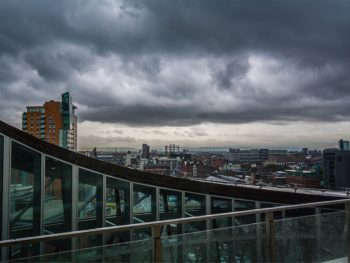Pressure is mounting on the Prime Minister to scrap proposed charges for the Greater Manchester Clean Air Zone, due to rising concerns on the impact to businesses and drivers.

The scheme has already been placed on a “short time-limited pause” to address fears about the issues for residents and now Greater Manchester’s mayor Andy Burnham has said it should be turned into a non-charging CAZ that doesn’t impact vans.
Writing to the Prime Minister, Burnham urged the scheme to be switched to a non-charging Class B Clean Air Zone. This would excludes van and minibuses, as well as cars, and would see the planned charges for non-compliant vehicles scrapped.
Instead, owners of non-compliant vehicles detected by cameras would be signposted to financial support for vehicle replacements – with the Government now being urged to commit to such support.
Burnham wrote: “We are of the clear view that any new scheme should be based on incentives for individuals and businesses to change vehicles rather than a charging penalty regime. But, to succeed, this will require your government to agree to the extra financial investment needed to enable vehicle upgrades to happen without the owners incurring unacceptable costs.”
The change of tactic has been backed by all nine Labour council leaders in the city region in a joint statement.
The Greater Manchester CAZ scheme was meant to go live this spring, after being pushed back from last year due to the pandemic.
The ‘Class C’ scheme approved by Greater Manchester last year had encompassed buses, coaches, taxis, private hire vehicles, HGVs, vans and minibuses but not private cars, and was intended to secure compliance with nitrogen dioxide (NO2) legal limits on local roads in the shortest possible time and to meet ministerial deadlines – initially set at 2024 and then moved back to 2026.
But while the authority had secured more than £120m in government funding to help businesses upgrade to cleaner, compliant vehicles, it asked the Government in January to pause the next phase of the financial support scheme, citing concerns over global vehicle supply chain issues, as a result of the semiconductor shortage and with particular issues for van supplies.
The concerns over the impact on van and minibus operators has led Burnham to call instead for a Class B scheme and for it to be made non-charging to focus on incentives instead.
Greater Manchester is not the first region to change tack on CAZ proposals; Southampton rejected a charging Clean Air Zone three years ago, while last year saw Leeds City Council abandon its plans for a charging CAZ as a result of a “dramatic shift” by businesses to cleaner vehicles. Its charging Class B scheme was put on hold for some months after pollution fell due to the pandemic, and a joint review by Leeds City Council and central government eventually concluded that it was no longer needed.
Meanwhile, the launch date for Bristol’s CAZ has been pushed back three months to September, due to both the challenges in sourcing vehicles and the expense of them.

